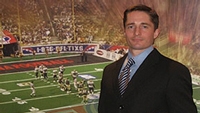Economic times challenge sports teams of all sizes
The professional video industry's #1 source for news, trends and product and tech information. Sign up below.
You are now subscribed
Your newsletter sign-up was successful

The New York Yankees, one of the richest sports teams in the nation, has hired a prominent residential real estate broker to help sell premium seats and luxury boxes in its new stadium.
Yankee President Randy Levin emphasized to the “New York Times” that hiring Prudential’s Douglas Elliman was not an indication of slow sales of high-end seats at its new $1.3 billion stadium. Yet, seven luxury suites and 1000 premium seats remain unsold.
Observers said it was the first time a high-end realtor had been brought in to sell sports seating. The cost of available seating ranges from $350 to $2500 per game. Buyers, the realtor said, can still get a 20-game package of seats for $7000 a seat.
While the Yankees struggle to maintain the high-end of the sports business in the sagging economy, the Arena Football League has suspended play for the 2009 season and the Women’s National Basketball Association recently watched one of its flagship franchises, the Houston Comets, shut down.
The AFL hopes to emerge as a more cost-efficient operation in 2010. “Every owner is committed to going forward,” acting Commissioner Ed Policy told “USA TODAY” of the 16-team league. “The question was: Do we restructure while we play or take a timeout and field teams again in 2010?”
”The decision was that trying to do it on the fly would be a challenge, but doing it on the fly in the worst economy any one of us has seen would have been irresponsible,” Policy said.
A major problem for all sports teams is sponsorship dollars, primarily those related directly and indirectly to the automobile and mortgage industries. ”Our biggest concerns remain with sponsorship,” Donna Orender, president of the WNBA, told the newspaper. ”Across the board, we’re seeing companies hesitating, holding back.”
The professional video industry's #1 source for news, trends and product and tech information. Sign up below.
Another problem for all sports is uncertainty. “Many companies say they still haven’t received a green light on their marketing budget for 2009, and we’re already into 2009,” said Dan Courtemanche, senior VP of marketing and communications for the MLS.
Still another factor is the changing face of the typical sports fan, said Nelson Gayton, executive director of UCLA’s Anderson Entertainment and Media Management Institute who teaches a course titled “The Changing Sports Entertainment Landscape.”
“Whatever sport delivers on the authenticity of the experience will prosper,” Gayton said.
